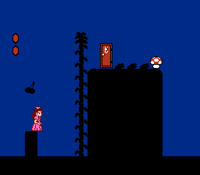Subspace: Difference between revisions
m (Text replacement - "(\| *publisher *= *Nintendo[^\n}]*)(\| *author *= *Nintendo)([\|}])" to "$1$3") |
m (Text replacement - "\| *((Jap|Ara|Arm|Bos|Bul|Cat|Chi|ChiS|ChiT|Cro|Cze|Dan|Dut|Est|Fin|Fre|FreA|FreE|Geo|Ger|Gre|Heb|Hin|Hun|Ice|Ind|Ita|Kor|Lat|Lit|Mac|Mal|Nor|Pol|Por|PorA|PorE|Rom|Rus|Ser|SerCro|Svk|Svn|Spa|SpaA|SpaE|Swe|Tha|Tur|Ukr|Vie)\d*) *= *([^\n]+) *<small>\(([^\n\(\)]+)\)<\/small>\n" to "|$1=$3 |$1N=$4 ") |
||
| Line 21: | Line 21: | ||
|GerM=Underworld | |GerM=Underworld | ||
|Ita=Subspazio<ref>{{cite|title=''[[Super Mario Bros. 2]]'' Italian manual|page=20}}</ref><ref>{{cite|title=''[[Super Mario Advance]]'' European manual|page=111}}</ref> | |Ita=Subspazio<ref>{{cite|title=''[[Super Mario Bros. 2]]'' Italian manual|page=20}}</ref><ref>{{cite|title=''[[Super Mario Advance]]'' European manual|page=111}}</ref> | ||
|Ita2=Zona d'ombra | |Ita2=Zona d'ombra | ||
|Ita2N=''The Super Mario Bros. Super Show!'' | |||
|Ita3=Sub-spazio<ref>{{cite|title=''[[Super Mario All-Stars]]'' Italian manual|page=20}}</ref> | |Ita3=Sub-spazio<ref>{{cite|title=''[[Super Mario All-Stars]]'' Italian manual|page=20}}</ref> | ||
|Ita4=Retro dello schermo<ref>{{cite|date=November 15, 2018|title=''[[Super Mario Bros. Encyclopedia|Super Mario Bros. Enciclopedia]]''|publisher=Magazzini Salani|language=it|isbn=889367436X|page=71}}</ref> | |Ita4=Retro dello schermo<ref>{{cite|date=November 15, 2018|title=''[[Super Mario Bros. Encyclopedia|Super Mario Bros. Enciclopedia]]''|publisher=Magazzini Salani|language=it|isbn=889367436X|page=71}}</ref> | ||
Revision as of 07:36, August 28, 2024
- This article is about the dimension in Super Mario Bros. 2. For the location in Super Smash Bros. Brawl, see List of The Subspace Emissary stages § Subspace.
Subspace,[1] alternatively spelled Sub-space[2][3][4] or Sub-Space,[5][6] also known as the Hidden World,[7] and misspelled as Sup-Space on one occasion,[8] is an alternate dimension to Subcon in Super Mario Bros. 2. It features dark terrain mirrored on a single screen, which the player cannot travel beyond. Subspace can only be accessed by entering a door from a Magical Potion. The player character can be in Subspace for a few seconds only, after which they are taken back into the main level. A Mushroom may appear in Subspace to be collected, depending on where the player character has entered from. All items found in any available red grass are transformed into coins when the player plucks them, though for the first two visits only, and any still-standing grass tufts give unripe vegetables afterwards. The player can still die by falling into a pit or drowning in quicksand, but this will allow another chance for obtaining coins. Depending on the area, players can also collect cherries, Starmen, and POWs. Cherries and POWs do not vanish upon returning to the main level. There are no enemies, but Phanto can follow the player into Subspace if they were holding the key. Within this zone, a few jars contain a Subspace Warp[9] that can be entered for the player character to instantly skip over to a later world, similarly to a Warp Zone in Super Mario Bros.
In the game's two remakes, the background is the same, but the level terrain is colored-in, rather than black. In Super Mario Advance only, Yoshi Eggs are hidden in Subspace after Wart is defeated.
In BS Super Mario USA, entering any jar in Subspace sends the player directly to Wart's chamber.
Names in other languages
| Language | Name | Meaning | Notes |
|---|---|---|---|
| Japanese | 裏画面[10] Uragamen |
Back Screen | |
| Chinese (simplified) | 虚拟世界[11] Xūnǐ Shìjiè |
Virtual World | |
| Dutch | Onderruimte[12] | Subspace | |
| French | Sous-espace[19][20] | Sub-space | |
| Subspace[21] | - | ||
| German | Unterwelt[13] | Underworld | |
| Italian | Subspazio[14][15] | Subspace | |
| Zona d'ombra[?] | Shadow zone | The Super Mario Bros. Super Show! | |
| Sub-spazio[16] | Sub-space | ||
| Retro dello schermo[17] | Back of the screen | ||
| Portuguese | Subespaço[?] | Subspace | |
| Spanish | Subespacio[18] | Subspace |
Trivia
- With the exception of the original Yume Kōjō: Doki Doki Panic, the music playing here is an arrangement of the overworld theme from Super Mario Bros.
References
- ^ 2001. Super Mario Advance instruction booklet. Nintendo of America (American English). Page 29.
- ^ 1993. Super Mario All-Stars Player's Guide. Nintendo of America. Page 87-88.
- ^ 1988. Super Mario Bros. 2 instruction booklet. Nintendo of America (American English). Page 19 and 20.
- ^ July/August 1988. Nintendo Power Volume 1. Nintendo of America (American English). Page 10.
- ^ September/October 1988. Nintendo Power Volume 2. Nintendo of America (American English). Page 43.
- ^ Spring 1991. NES Game Atlas. Nintendo of America (American English). Page 13, 16, and 21.
- ^ 1989. Super Mario Bros. 2 Inside Out, Part I. Nintendo Power (American English). Page 6.
- ^ Spring 1991. NES Game Atlas. Nintendo of America (American English). Page 18.
- ^ June 13, 2001. Super Mario Advance Official Pocket Guide. Bradygames (American English). ISBN 0-7440-0077-7. Page 105.
- ^ 1987. Yume Kōjō: Doki Doki Panic instruction booklet. Nintendo (Japanese). Page 21 and 26.
- ^ SMG114514 (February 27, 2017). 小神游GBA官方游戏宣传视频. Bilibili (Simplified Chinese). Retrieved June 4, 2024.
- ^ Club Nintendo (Netherlands) Classic. Page 31.
- ^ 2001. Super Mario Advance instruction booklet. Nintendo of Europe (German). Page 31.
- ^ Super Mario Bros. 2 Italian manual. Page 20.
- ^ Super Mario Advance European manual. Page 111.
- ^ Super Mario All-Stars Italian manual. Page 20.
- ^ November 15, 2018. Super Mario Bros. Enciclopedia. Magazzini Salani (Italian). ISBN 889367436X. Page 71.
- ^ 2001. Super Mario Advance instruction booklet. Nintendo of Europe (European Spanish). Page 91.
- ^ Super Mario Bros. 2 instruction booklet. Nintendo (French). Page 21.
- ^ Super Mario All-Stars instruction booklet. Nintendo (French). Page 21.
- ^ 2001. Super Mario Advance instruction booklet. Nintendo of Europe (French). Page 51.
